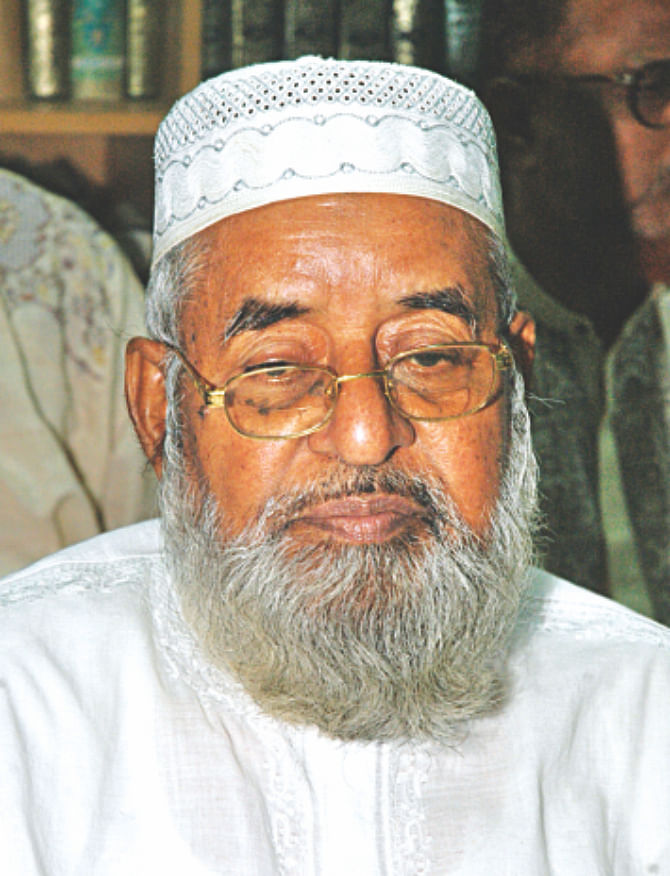Subhan verdict any day
Subhan verdict any day

The trial of war crimes accused Jamaat-e-Islami leader Abdus Subhan ended yesterday and the International Crimes Tribunal-2 kept the case waiting for verdict delivery.
Subhan, the alleged vice-chairman of anti-liberation Peace Committee in Pabna in 1971, faces nine charges, including that of genocide, committed in the district during the Liberation War.
The charges are based on incidents that took place in Pabna between April 13 and October 30 in 1971, in which several hundred people were killed.
The prosecution sought the death penalty for the Jamaat nayeb-e-ameer claiming that they had been able to prove all nine charges. They also prayed for adequate compensation for the victims.
Subhan's defence lawyers claimed that the allegations brought against their client were “totally false and baseless” and believed the tribunal would acquit him.
If convicted, the octogenarian politician may face the death penalty for the crimes he allegedly committed 43 years ago.
It is not possible to say how many days the court would take before delivering the verdict. The tribunal took as little as 25 days to deliver the verdict in a war crimes case and as long as six months for another.
The verdict delivery in the war crimes case against ex-state minister Syed Mohammad Qaisar has been pending since August 20.
Yesterday, Prosecutor Tureen Afroz refuted the defence's arguments saying Subhan bore individual, joint and superior criminal responsibility for all the crimes mentioned in the charges.
She, however, said if the tribunal found the accused could not be made liable for his superior status in certain charges, the court could hold him liable for individual and or joint criminal responsibility.
Tureen said Subhan should be given the capital punishment in the “interest of justice and complete justice”, “for the protection of rights of the victims” and “for meeting the society's reasonable expectation”.
Defence counsel Ehsan A Siddiq said the relevant law did not allow the court to compensate victims. He also refuted some points raised by Tureen, including collective memory and cumulative conviction in a single charge.
After the prosecution and the defence completed their submissions, the three-member tribunal, led by Justice Obaidul Hassan with members Justice Md Mozibur Rahman Miah and Justice Md Shahinur Islam, kept the case CAV (Curia Advisari Vult), a Latin legal term meaning verdict could be delivered any day.
Subhan, the son of Sheikh Naimuddin and Nurani Begum of Tailakundi village of Sujanagar upazila in Pabna, was the general secretary of Pabna Peace Committee, according to the prosecution. Later, he was promoted to the vice-president of the associate body of the Pakistan army in 1971.
He was the founding ameer of Jamaat in Pabna and a Majlish-e-Sura member of the united Pakistan Jamaat during the war. He organised the Razakars in Pabna, they said.
He was elected unopposed as a member of the National Assembly of Pakistan in 1971 when the nation was engaged in a battle against the Pakistan army and its local collaborators.
Subhan fled to Pakistan towards the end of the war, prosecution evidence says.
Law enforcers arrested Subhan on September 20, 2012, and after a 17-month-long probe, the war crimes investigation agency submitted its probe report to the prosecution on September 12, 2013. Three days later, the prosecution submitted formal charges.
Tribunal-1 on December 31 last year framed nine war crimes charges against Subhan. Later, the case was moved to Tribunal-2.
The most notable of the nine charges brought against Subhan is for the killing of 300-400 people by the Pakistan army and its local collaborators under his alleged leadership in several villages of Satbaria union on May 12, 1971.
Other charges brought against Subhan are for: the killing of five people and injuring three others at Juktitala village in Ishwardi on April 13; abduction and killing of three named people and several unnamed on April 17-18 in Ishwardi; killing of five people and looting and torching of several houses in Sahapur village in Ishwardi on May 2; abduction and torture of two people from Arankhola cattle market in Ishwardi on May 16; killings and torching of houses at Fulunia and Dogachhi villages in Pabna on May 11; abduction and killing of at least 18 people of Varara village in Pabna in May; abduction and killing of two people of Dublia Bazar of Pabna in the first week of September; and abduction and killing of four people of Betbaria village in Ishwardi.
The prosecution produced 31 witnesses, including two investigation officers, and documents to prove the charges. The defence did not produce any witnesses saying that they did not feel the need.
LAWYERS CAUTIONED
The tribunal yesterday asked prosecution and defence lawyers to be more careful in making comments before the media on court proceedings.
“You are officers of the court. You should not talk about things that hurt the court and tarnish its image. If you do so, it will also tarnish your image,” said Justice Obaidul Hassan.